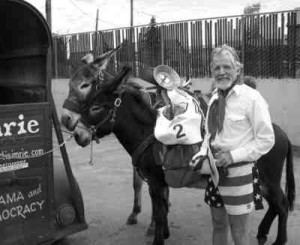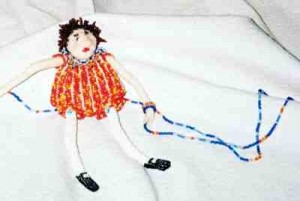Essay by Ed Quillen
Politics – May 2008 – Colorado Central Magazine
FOR A WHILE, I was following the Democratic presidential contest every chance I got, and those chances come frequently when you spend most of the day sitting at a computer with a broadband Internet connection.
Lately I’ve slacked off, more or less out of superstition. I want Sen. Barack Obama to win, and I feel as though I’ll jinx the process if I pay too much attention. So I skipped the initial uproar over the accusations that he was an “elitist” because, during the Pennsylvania primary campaign, he made this remark at a closed- door fund-raising event in San Francisco: “It’s not surprising that they get bitter, they cling to guns or religion or antipathy to people who aren’t like them or anti-immigrant sentiment or anti-trade sentiment as a way to explain their frustrations.”
This drew a blast from Sen. Hillary Clinton: “I was taken aback by the demeaning remarks Sen. Obama made about people in small-town America. Sen. Obama’s remarks are elitist and they are out of touch. They are not reflective of the values and beliefs of Americans. Certainly not the Americans that I know — not the Americans I grew up with, not the Americans I lived with in Arkansas or represent in New York.”
Only in America, I suspect, would a multi-millionaire Wellesley College graduate with a law degree from Yale attack a prosperous Columbia University graduate with a law degree from Harvard — for being “elitist.”
As a 34-year resident of “small-town America,” I’ve certainly seen people get bitter when the mine or sawmill closes.
Living out here where jobs are rare, benefits are rarer, and odd jobs pay a pittance, but there’s never any shortage of people clamoring for more trails, golf courses, and green space, I’ve noticed that some of us do occasionally go postal. And a few inevitably start threatening to shoot immigrants, environmentalists, county commissioners, the town council, and whoever else they think is making our lives a misery.
That’s crazy, of course, since nobody knows better than a small town resident — who can still fix his own vehicle and use a pistol — who really has the big guns and numbers. But there you have it; modern life can make you crazy. And I’m not sure what’s “elitist” about commenting on such things.
What puzzles me more is just when being “elitist” became a bad thing in Presidential politics. George Washington was likely the richest man in America. John Adams was a Harvard graduate and a successful lawyer. Thomas Jefferson was a graduate of William and Mary and a planter with several estates.
THE FIRST “NON-ELITIST” president was likely Andrew Jackson, who took office in 1829 and served two terms. He was pretty much a self-made man, and he campaigned as the voice of the common man. He said, “It is to be regretted that the rich and powerful too often bend the acts of government to their own selfish purposes,” and I’d sure like to hear a modern president proclaim the same.
I don’t know that Jackson ever referred to John Quincy Adams, his opponent in 1824 and 1828, as an “elitist.” But Jackson, who had a rudimentary formal education and who made his career in the rough and tumble settlements of frontier Tennessee, must have harbored such thoughts about J.Q. Adams, the son of a president and a Harvard graduate who had served as an ambassador and secretary of state. (It was he who negotiated the 1819 treaty that made our Arkansas River an international boundary.)
Did Jackson start an anti-elitist trend, though? Apparently not.
Franklin D. Roosevelt was a trust-funder with a Harvard degree, married to the niece of a previous President Roosevelt. He was about as “elite” as an American can get, but he didn’t see any need to pretend to be otherwise.
George H.W. Bush, son of a senator and a Yale graduate, professed to love pork rinds and the Oak Ridge Boys, at least during campaign seasons. John F. Kennedy did the reverse. He created an image of himself as a cultivated connoisseur of classical music and fine literature, but he really liked show tunes and Ian Fleming novels.
We seem to be of many minds about “elitism” in America.
For example, having never had a lucrative portfolio or a brand new car, I tend to regard the filthy rich as elitist swine. Be it right or wrong, I blame the bosses, bankers, power brokers, leaders of industry, and trustfunders for how darned hard it is for the rest of us to make ends meet.
But years ago, I was at a Salida School Board meeting where they talked about a “gifted and talented program,” and someone in the audience denounced it as “elitist.” He saw no reason to provide programs for smart kids to improve their knowledge and skills.
Yet no one ever complains of “elitism” when the football coach wants to put his best 11 players on the field. And schools routinely make sure all of their players get the training and coaching they need.
In other words, an “athletic elite” is the American way, but an “academic elite” is a threat to democracy. Every so often in my career as a Denver Post columnist, I get accused of belonging to the “Colorado elite.” I just wish that being part of that “elite” meant that my house had more than one bathroom, and that I’d never have to stand in line for anything.
The word “elite” makes for a bizarre insult, since it can imply all sorts of things. Does it mean good? Bad? Rich? Smart? Arrogant? Well-educated? Superior?
From now on, I think I’ll just assume that being called an elitist is a compliment, and say thank you — even if it wasn’t meant as one.
*************
BACK TO JACKSON. He is alleged to have observed that “It is a damn poor mind indeed which can’t think of at least two ways to spell any word.”
That’s one way to look at a mistake we made twice last month, printing “incite” instead of “insight.”
More properly, though, it’s not a spelling error, but a homonym problem. Homonyms are words that sound the same but are spelled differently, as with their, there, and they’re; and one and won; and two and too and to; and are and our; and be and bee; and see and sea; and idle and idol; and right and rite; and here and hear; and bear and bare; and where, and wear, and ware….
At least those things are all pronounced the same in my Colorado dialect. (I had a teacher in seventh grade who insisted that pin and pen are pronounced differently, but I never could hear that.)
Homonyms are something that trouble me from time to time. When I’m reading material, I tend to “sound it aloud to myself,” and if it sounds right, no alarms go off. I suspect that’s true of many people.
It can strike in unexpected ways. Years ago, I worked at The Mountain Mail (or could it be Male? A friend’s dad, upon hearing the name of his daughter’s new employer, asked if it was a porn magazine), and covered a banquet where youngsters were awarded prizes for their posters. I listed one as “Aaron Jones” when it was “Erin Jones.” Another time I did the same thing with Dawn and Don. There is no better way to make parents angry than to misspell their children’s names in the newspaper. So I got in the habit of looking for a written version of the names, rather than rely just on my ears.
There are grammar-checking computer programs which can be set to spot homonyms. I tried one about 20 years ago. The problem was that it had no sense of context. Any time it spotted incite, as in something like “He was charged with trying to incite a riot,” it would pop up with “Do you mean incite or insight or in sight?” That was so annoying and time-consuming that I gave up on such software.
Besides, homonyms are (our) more (moor) common than (then) fleas (flees), so (sew) no (know) program can (ken) catch (ketch) all (awl) of them.
Perhaps the newer versions are better. They should be, given that desktop computers are so much more powerful now than they were then.
But I remain dubious. I like to use the spell-checker after I’ve written something. However, despite the modern “auto-correct” feature, when I’m writing I want to write, not deal with misspelled words, which can wait. I don’t like the “auto-complete” feature either — I want what I type, and nothing else. The computer isn’t supposed to do my writing for me.
No matter how careful we are, mistakes will creep in. In the trade, there’s a saying that “Doctors bury their mistakes. We print ours.”
Jim Little, publisher of the Wet Mountain Tribune in Westcliffe, once observed that mistakes are like weeds in a garden. You never get them all, but you have to try.
Or I could observe that our mistakes demonstrate that Colorado Central is not an elitist publication and thus by modern American public standards, that makes us virtuous.


